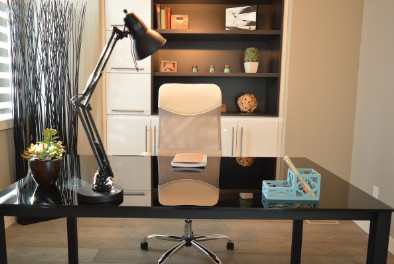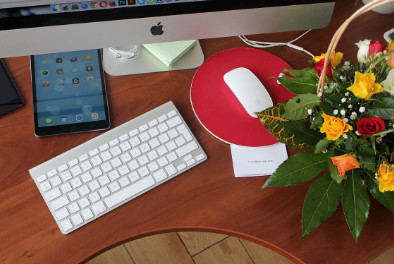Keeping healthy and happy at work
There is a simple and insightful proverb saying that you cannot pour from an empty cup. With all our staff involved in complex, stressful projects, and more importantly, with a pandemic that changed the way we work fundamentally, we realized that coming up with a simple plan to stay high-energetic, productive, engaged, and happy, is key. We’re far from being experts in such matters, but based on specialist advice, we came up with our own set of tips to make you tick all of the above during those 8 hours spent working.
We all know that certain things are easier said than done, but trying to lead a healthy lifestyle will impact considerably on the way you perform at work. Making sure to get enough rest and taking care of your body will definitely help start your day with a huge smile on your face. Many will argue that life is not made for sleeping, and if this works for them, then who are we to dispute? For the rest of us, mortals, a good night sleep will do wonders during the day.
If you want to find out more about life at Clever++, we are here to answer all your questions.
Lauren Whitt, the head of global resilience at Google thinks that “Our sleep routines are the best opportunity to reach into our minds and be able to recover from any of the stressors of the day.”
Certain managers agree that in order to be productive, staff should keep personal problems personal, but we have a different approach.

We all know that nobody’s life is ever going to be completely problem-free, and, on top of that, the last couple of years have been pretty hectic. That’s why we encourage our colleagues to speak up if they feel like it. When you are able to voice your feelings to people who share similar backgrounds or lifestyles and understand you, it can really help minimize stress.
Because many times it is difficult to leave personal worries at home, it is good to develop some sort of an office support system. We found out that a short coffee or tea gathering before our stand-up meeting was a great way for us to let personal problems go and easily shift into our daily tasks.
As your day starts, why not make yourself as comfortable and relaxed as you can be in your office? Make your space your own, decorate your area as much as the company permits, or, if you work from home, as much as you like. Fill it with things that make you smile: flowers, pictures, postcards with favorite travel destinations, the options are endless. You will be amazed to see the impact they will have on your day.
Lunch at work is a tricky one because it’s difficult to be picky when the choices are limited. When preparing your lunchbox or ordering, just know that a combination of whole foods, as opposed to refined foods such as sugar and bread, can really make a big difference in your energy level and attitude. For those ones that prefer the mouth-watering burger, we say GO FOR IT! We’re not writing this article to teach you how to stay fit, we’re writing it to teach you how to be happy at work. Just remember to keep yourself properly hydrated, and avoid unhealthy snacks.
“The junk food and snacking issue looms large when you start working at home, especially if you’re feeling stressed. Think of eating healthy lunches as another form of self-care, because that gives you the nourishment you need to have consistent energy”, productivity expert Tonya Dalton suggests.
At Clever++ we learned that when handling our workload, one of the most important factors is the way we organize ourselves. Like most of the companies in the IT industry, we use an Agile project management system, so we are familiar with this process of planning, executing, and evaluating.
For others who don’t use the same systems, we say “Be proactive and take control.” Find the right apps that can help you manage your work. It is hard to achieve that feeling of accomplishment when your work is all over the place. Ticking that box will definitely give you that sense of satisfaction, and will enhance your confidence and motivation.
And why not go a bit further and reward yourself for a job well done? Simply identify a reward outside of your job, and indulge yourself. Dinner with colleagues or friends, a movie, a gym workout or a manicure session are all good choices. All these positives can influence your mood at work.
Having a positive atmosphere at work is key for a positive mindset, but we all know that it’s not always frictionless. It might be a bit too late to try and change your colleagues, instead just figure out a way to resolve conflicts and avert uncomfortable situations. Easier said than done, but remember – you create your own mindset. Remind yourself of why you looked forward to working at your job when you first started it and try to find that feeling of excitement again.
Your mindset is indeed important, but keeping your body in top shape is equally crucial. Knowing how to sit properly while at work could help to prevent future issues like lower back pains and sprains, or provide relief. So, try and acquire a good ergonomic office chair that helps you keep your eyes in line with the screen, provide maximum comfort and support to your wrists, shoulders and neck.
You don’t have to be an expert to realize that keeping your legs in certain positions can obstruct normal blood flow, so try to avoid crossing them or having them in any position that creates that uncomfortable tingling feeling in your toes. Position them at a 90 degree angle and move them as much as you can to stimulate blood flow.
Avoiding burnout
Even if it doesn’t fall in the list of medical diagnosis, burnout is a real problem, particularly in these times when our ability to deal with things is somehow impaired by other concerns like the health factor, the wellbeing of our family, or the feeling of isolation. The fact that it can affect your physical and mental health is strong enough to make us think of it as serious and try to come up with ways to tackle it.

The first step is to regard it as a work-related problem, so before waiting for your employers to create any support programs against it, there are certains things that you can do.
The easiest thing to do is to use the off switch, and every hour or so, take a breather. Whether it’s meditation, taking a walk, stretching, or listening to music, allowing yourself some “you” time can help you feel less stressed. Working at a desk can be a very sedentary job, so it’s especially important to take a few minutes during your workday to get up and move a little. You might even consider doing some push ups to get that body in shape for the next holiday.
Have a set schedule for the day, try and finish your tasks during your time at work and forget about checking what’s happening on Slack during your time off.
“Don’t make a daunting to-do list that threatens to send your stress levels soaring, but have a general grasp of what you’d like to accomplish today and when you’ll tackle those projects, as well as when you’ll take breaks”, says Sharon McDowell-Larsen, PhD, an exercise physiologist at the Center for Creative Leadership.
Another easy thing we have successfully implemented is communicating more. We are aware of the fact that most of the time during busy projects, people just bury themselves in work and forget about everyone else around. And especially with the pandemic driving remote work, the lack of communication intensifies that feeling of isolation. Therefore, we use messaging platforms to stimulate conversations, office jokes, and simply connect with each other. No matter how bad our hair looks in the morning, we have this culture where we all turn on our videos, unless someone’s not feeling so well.
In most of the cases, changes at personal level can prove sufficient. In other cases, when employees are hyper engaged in complex projects for long periods, organizations should come to help with well-being programs developed to support them to handle the workload easier. One positive example is Facebook who not only understood that burnout is a real problem but instead extended their well-being program to cover other mental issues that their employees might face due to work-related stress.
“We are trying to design our benefit programs around moments that matter in people’s lives. That’s really our north star.” – Renee A., Director of Life@, Facebook’s employee programs and benefits team.
At Clever++, we found out that one of the best approaches to combat burnout for our developers is to help connect back with their purpose, with the way their work impacts real human beings. To do this, we took on a special project and developed a website for Owlro, an NGO and psychological practice that deals with children and adolescents with socio-emotional, behavioral or developing difficulties, showing our long-run support.
As a conclusion, our advice is to be proactive. Find out what works for your team and focus your strategies on keeping staff happy and satisfied with their work environment. This way, they will feel put first as valued members of the team and they will likely always give their best.
If you want to know more about life at Clever++, please visit our website.




